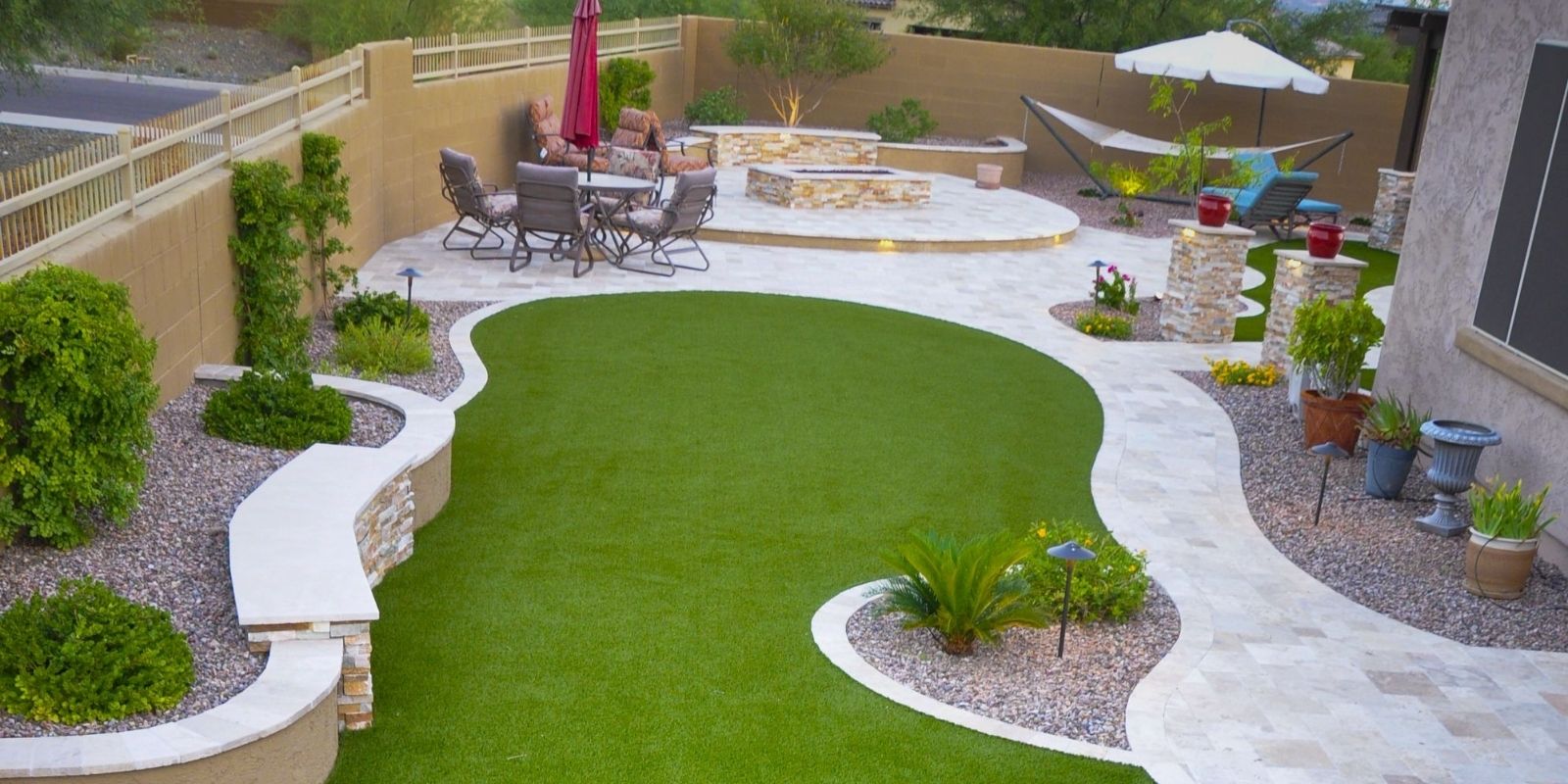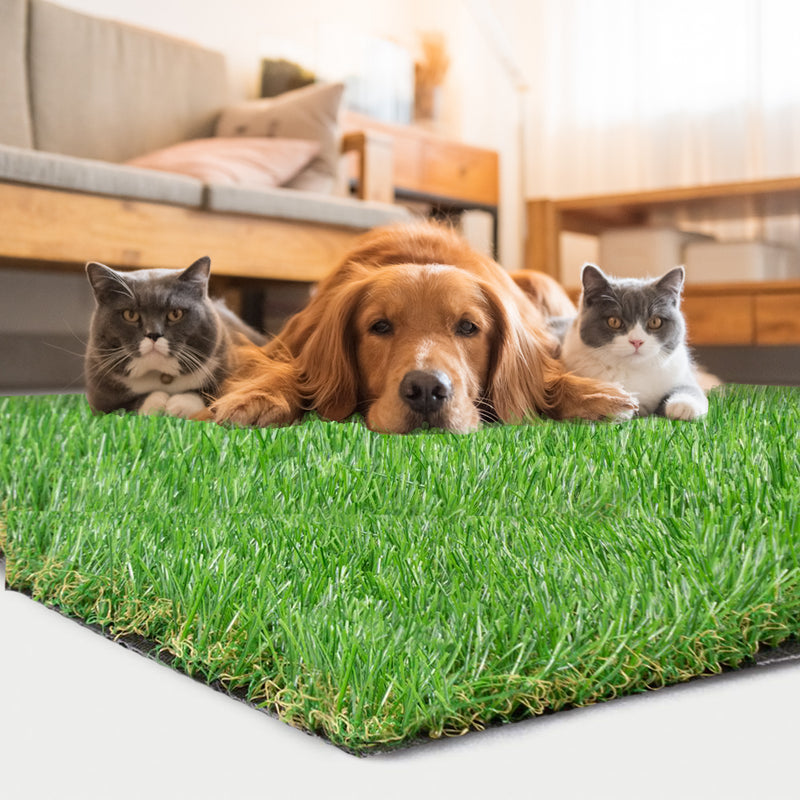See Why Homeowners Prefer Artificial Grass for Lasting Landscape Design Practices
As home owners significantly focus on sustainability in landscape design, synthetic grass has actually become an engaging choice to typical yard. Its capacity to preserve water, minimize maintenance initiatives, and decrease ecological effect settings it as a functional option for those seeking environment-friendly options. Moreover, the aesthetic charm and versatility of artificial lawn deal with diverse layout choices. Nevertheless, the implications of this change extend past plain comfort and aesthetics, motivating a better evaluation of just how these options affect wider environmental end results. What continues to be to be discovered is the full extent of benefits that synthetic grass can supply to house owners and the atmosphere alike.
Water Conservation Advantages
Among one of the most significant advantages of synthetic grass is its function in water conservation. Standard yard lawns require considerable quantities of water to maintain their rich look, frequently causing overuse of neighborhood water sources, especially in deserts. On the other hand, synthetic grass removes this need totally, as it does not require irrigation. This not only saves water yet also decreases the strain on community water systems, especially throughout dry spell problems.
In addition, the installment of synthetic grass can add to an extra sustainable landscape. Property owners can considerably lower their water bills, enabling reallocation of resources to other ecological initiatives or home uses. Furthermore, synthetic grass is designed to withstand numerous weather problems without the need for supplementary watering, making it an excellent choice for regions dealing with water deficiency.
The ecological benefits extend past prompt water savings. By lowering water intake, man-made lawn helps to reduce the effects of environment adjustment, preserving vital communities that are threatened by too much water extraction. As lasting landscaping techniques get traction, man-made turf arises as a responsible selection for house owners seeking to produce environment-friendly outside spaces.
Lowered Maintenance Initiatives
Synthetic lawn considerably lowers maintenance efforts contrasted to traditional lawn lawns. With man-made grass, house owners can remove the time-consuming jobs related to all-natural landscaping, such as mowing, feeding, and weeding. This not just saves useful time but likewise lowers physical labor, making grass care obtainable for individuals of any ages.
Among the most noteworthy benefits is the lack of normal mowing. Conventional yards call for frequent trimming to preserve a cosmetically pleasing height, whereas synthetic grass continues to be consistently lush without the requirement for reducing. In addition, house owners no much longer require to apply fertilizers or pesticides, which are often required to keep natural lawn healthy and balanced. This shift not only lightens the work yet additionally advertises a neater, more uniform appearance year-round.
In addition, synthetic grass is resistant and sturdy, requiring minimal upkeep beyond periodic cleaning and rinsing to remove debris. This ease of maintenance allows house owners to appreciate their exterior rooms without the consistent worry of maintenance, giving more time for leisure and family activities. Ultimately, the decreased upkeep initiatives associated with synthetic grass make it an appealing alternative for those seeking a low-maintenance, visually appealing landscape.

Ecological Impact Reduction
There is a growing recognition of the ecological advantages associated with synthetic grass, especially in regards to water preservation and lowered chemical usage. Traditional grass require considerable amounts of water, particularly in drought-prone areas, bring about raised strain on local water resources. In contrast, synthetic grass gets rid of the requirement for irrigation, dramatically minimizing water usage and advertising sustainability.
Furthermore, traditional lawn maintenance frequently involves the application of plant foods, herbicides, and chemicals, which can add to dirt and water pollution. Artificial lawn mitigates this ecological danger by needing very little upkeep and virtually eliminating the demand for dangerous chemicals. This not only enhances dirt health and wellness however also protects neighborhood ecological communities from poisonous overflow.
Furthermore, the production of all-natural lawn lawns commonly includes making use of fossil gas for cutting and landscaping equipment, further adding to greenhouse gas discharges. By picking fabricated grass, homeowners can dramatically reduce their carbon footprint related to lawn treatment activities.
Visual Appeal and Versatility
In addition to its ecological advantages, synthetic grass provides considerable visual appeal and adaptability for landscape design. Homeowners can accomplish a rich, environment-friendly look year-round, eliminating the seasonal fluctuations typically connected with natural lawn. This regular visual not only enhances the aesthetic allure of a building yet also adds to a properly maintained and sleek appearance.
In addition, synthetic grass is readily available in a range of designs, appearances, and shades, permitting personalization to suit individual preferences and design motifs - Arizona turf. Whether made use of in household yards, business areas, or leisure locations, it can flawlessly incorporate into diverse landscaping designs, from modern-day minimal to lavish tropical settings
The flexibility of fabricated lawn expands past mere look; it can be mounted in different locations, consisting of roofs, outdoor patios, and also interior areas, producing opportunities for unique landscape design options. Additionally, it is suitable for a series of activities, from youngsters's play areas to pet-friendly environments, giving capability without jeopardizing design.
Inevitably, the aesthetic charm and flexibility of artificial lawn make it an eye-catching alternative for homeowners looking for sustainable landscaping remedies that do not give up appeal for environmental duty.

Long-Term Expense Cost Savings
One of the most compelling advantages of synthetic grass is its capacity for long-lasting expense savings. Unlike natural turf, which needs regular use this link upkeep-- consisting of mowing, watering, feeding, and bug control-- synthetic grass dramatically lowers these recurring costs. House owners can save a considerable amount on water costs, specifically in areas where water shortage is a pressing issue. The removal of grass treatment services Click This Link further contributes to economic cost savings, as there is no requirement for specific equipment or labor.
Additionally, fabricated grass has a lifespan of 15 to 25 years, depending upon its quality and use. This toughness reduces substitute expenses, making it a more affordable option over time. The initial financial investment in synthetic lawn can often be redeemed through the financial savings built up over time.
While the upfront expense might seem greater contrasted to turf installation, the advancing cost savings from reduced upkeep and water usage frequently exceed these first expenditures. Inevitably, the adoption of artificial lawn not just advertises a sustainable landscaping option but likewise uses homeowners an economically savvy choice that straightens with lasting budgeting goals.
Conclusion
Man-made grass emerges as a compelling alternative for lasting landscape design, providing considerable advantages in water preservation, minimized maintenance efforts, go to these guys and lessened ecological effect. As communities increasingly prioritize eco friendly practices, the fostering of man-made turf represents a dynamic step toward attaining sustainable and resilient landscapes.
In addition, man-made turf is designed to hold up against various weather conditions without the need for extra watering, making it a suitable choice for areas facing water deficiency. (Arizona artificial turf)

Artificial turf arises as an engaging choice for sustainable landscape design, supplying substantial advantages in water conservation, reduced upkeep efforts, and decreased ecological influence.